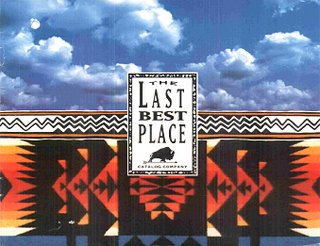District Court Skewers PTO, Grants Summary Judgment in "THE LAST BEST PLACE" Lawsuit
The U.S. District Court for the Eastern District of Virginia did not mince words in granting summary judgment to Last Best Beef, LLC in its lawsuit against the USPTO. The court ruled that the PTO, in cancelling two registrations owned by Last Best Beef for the mark THE LAST BEST PLACE, and in suspending four applications and two oppositions proceedings, had "improvised a series of actions without any authority to do so," amounting to "an arbitrary abuse of discretion" and a "clear error in judgment." Last Best Beef, LLC v. Dudas, Civil Action No. 1:06-399 (E.D. Va. September 27, 2006).

The April 24, 2006 TTABlog entry (here) set out the background facts regarding this dispute. The PTO acted pursuant to Section 206 of the 2006 Department of Commerce Appropriations Act, which prohibits the use of any Commerce Department funds to "register, issue, transfer or enforce any trademark of the phrase 'Last Best Place.'" That provision was sponsored by Montana Senator Conrad Burns, who publicly asserted that the mark THE LAST BEST PLACE "belongs to the State of Montana."
Last Best Beef contended that the PTO's actions were illegal because the Lanham Act does not provide for such actions, and it further argued that Section 206 violates the Fifth and Fourteenth Amendments. The court found it unnecessary to reach the constitutional issue because it ruled that:
"(1) Congress failed to explicitly suspend provisions of the Lanham Act with respect to the phrase 'Last Best Place,' and (2) the actions taken by the USPTO in response to the enactment of Section 206 demonstrate a 'clear error in judgment' given that Section 206 does not authorize the cancellation, suspension, or 'freezing' of pending trademark applications or Notices of Allowance."
The court concluded that Section 206 "improperly circumvents the Lanham Act and, therefore, is invalid legislation."
"In the absence of manifest congressional intent, the Court is unwilling to infer from a single sentence in an appropriations bill that Congress intended to undermine or bypass well-established provisions of trademark law in order to protect a single phrase from commercial control."
In its 32-page decision, the court discussed the ramifications of allowing such "whimsical exceptions to the Lanham Act like those that riddle the Tax Code:" the practice might potentially destabilize a business's ability to brand its products and services; it could turn the Trademark Act into a statute "full of holes and exceptions;" and it would mean that "a trademark application for a certain phrase would be stranded without any of the procedure and protection afforded by the Lanham Act."
The court noted that the PTO, without "clear guidelines as to how to properly deal with trademark applications" for THE LAST BEST PLACE, "decided to improvise a system of cancellation and suspension that is not provided for in the Lanham Act or the Trademark Manual." This amounted to a "clear error in judgment" under the precedents of the 4th Circuit interpreting the provisions of Administrative Procedure Act that govern judicial review of agency actions.
The court therefore ordered the PTO to reinstate LBB's applications and registrations
TTABlog comment: One might ask, what else could the PTO have done when faced with the directive of Section 206? I think it might have taken the position that it was in fact not directly expending funds on registration of the mark THE LAST BEST PLACE, per se. In other words, there were no specific items in the PTO budget designated for registration of that mark, and so the PTO was already in compliance. The PTO might argue, however, that as a practical matter, it did not have that option.
[A thank you to David M. Monachino, Esq., of the New York office of Seyfarth Shaw LLP, counsel for plaintiff LBB, for providing me with a copy of the opinion upon my request.]
Text Copyright John L. Welch 2006.




0 Comments:
Post a Comment
<< Home